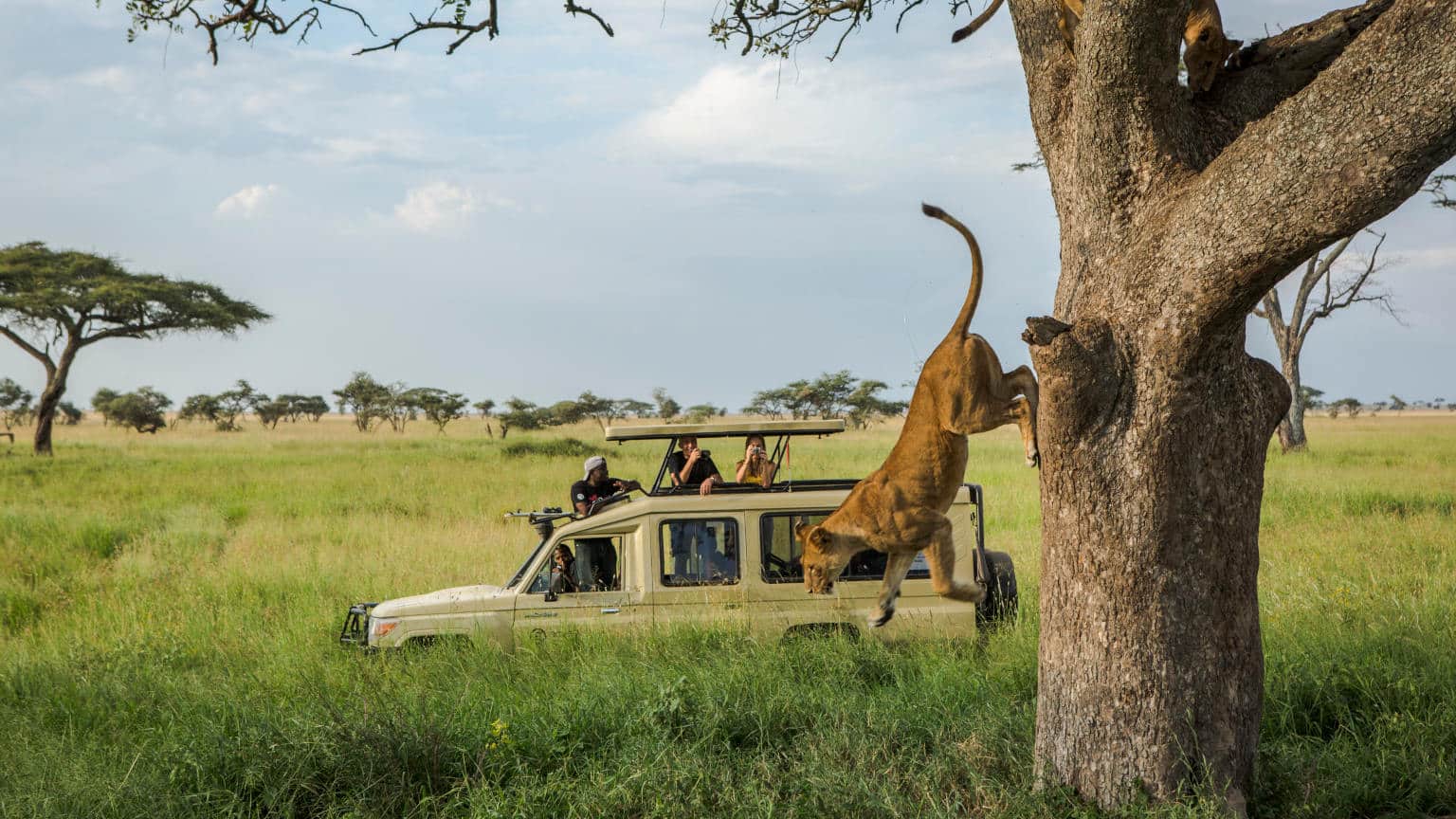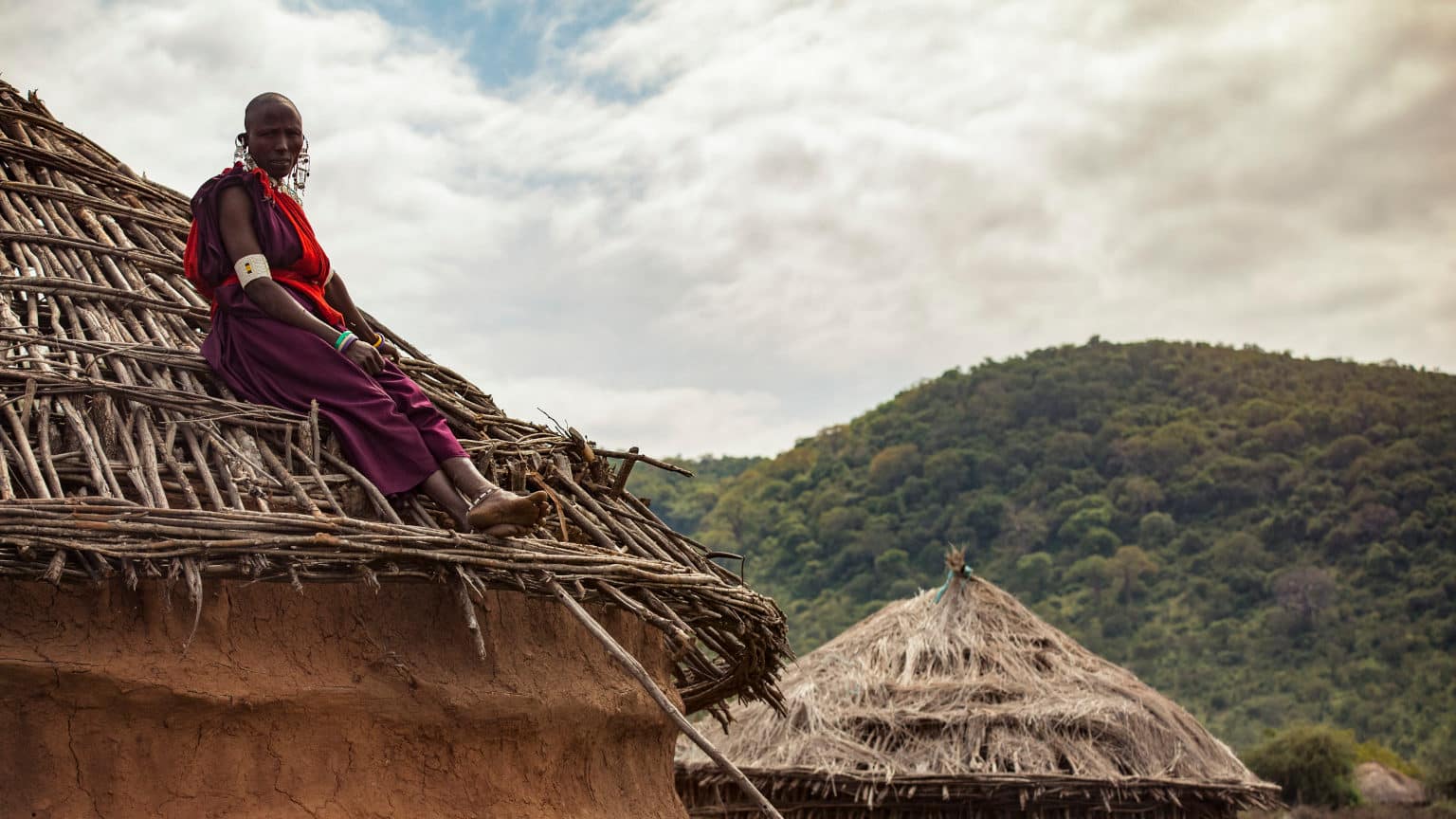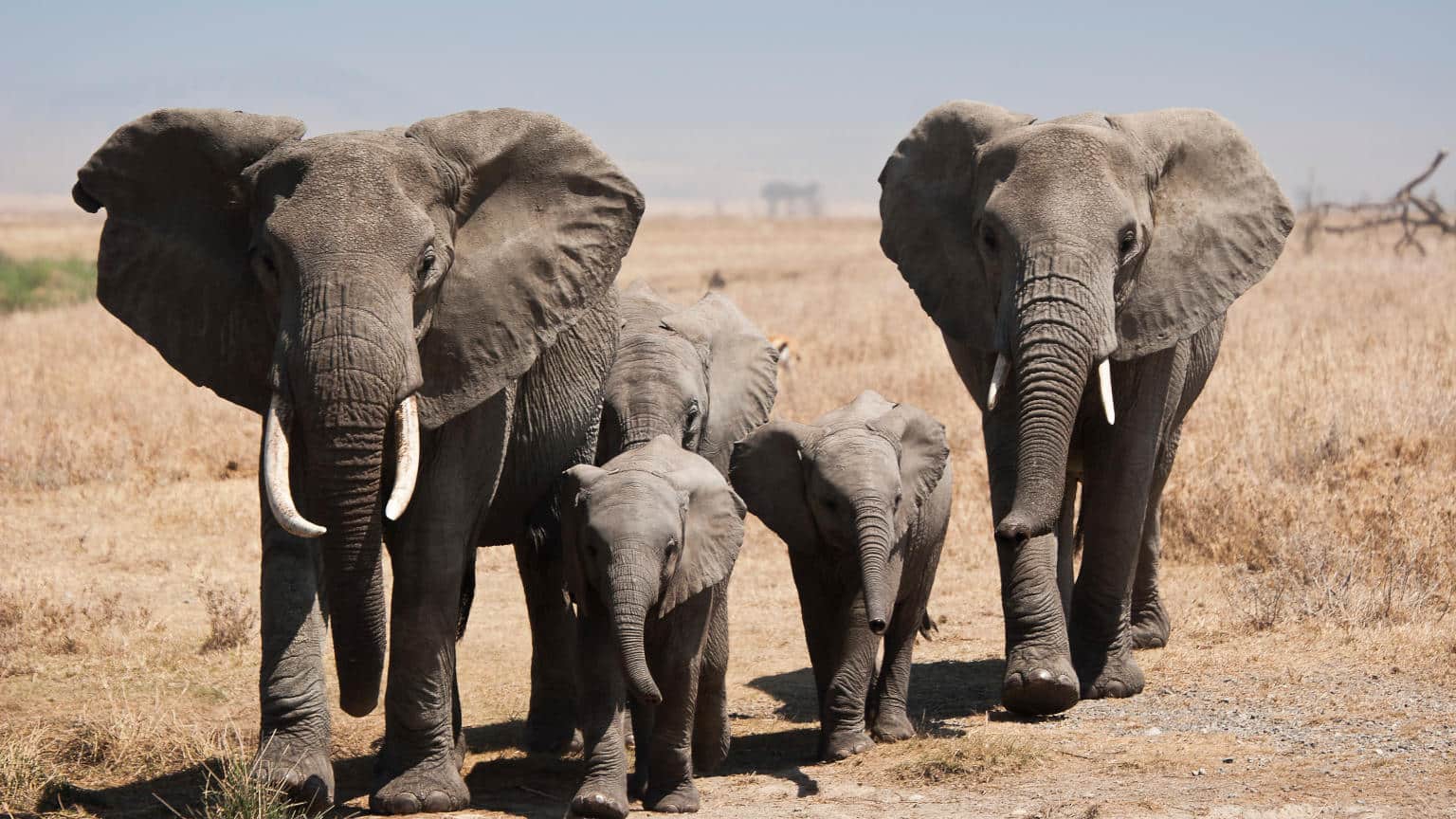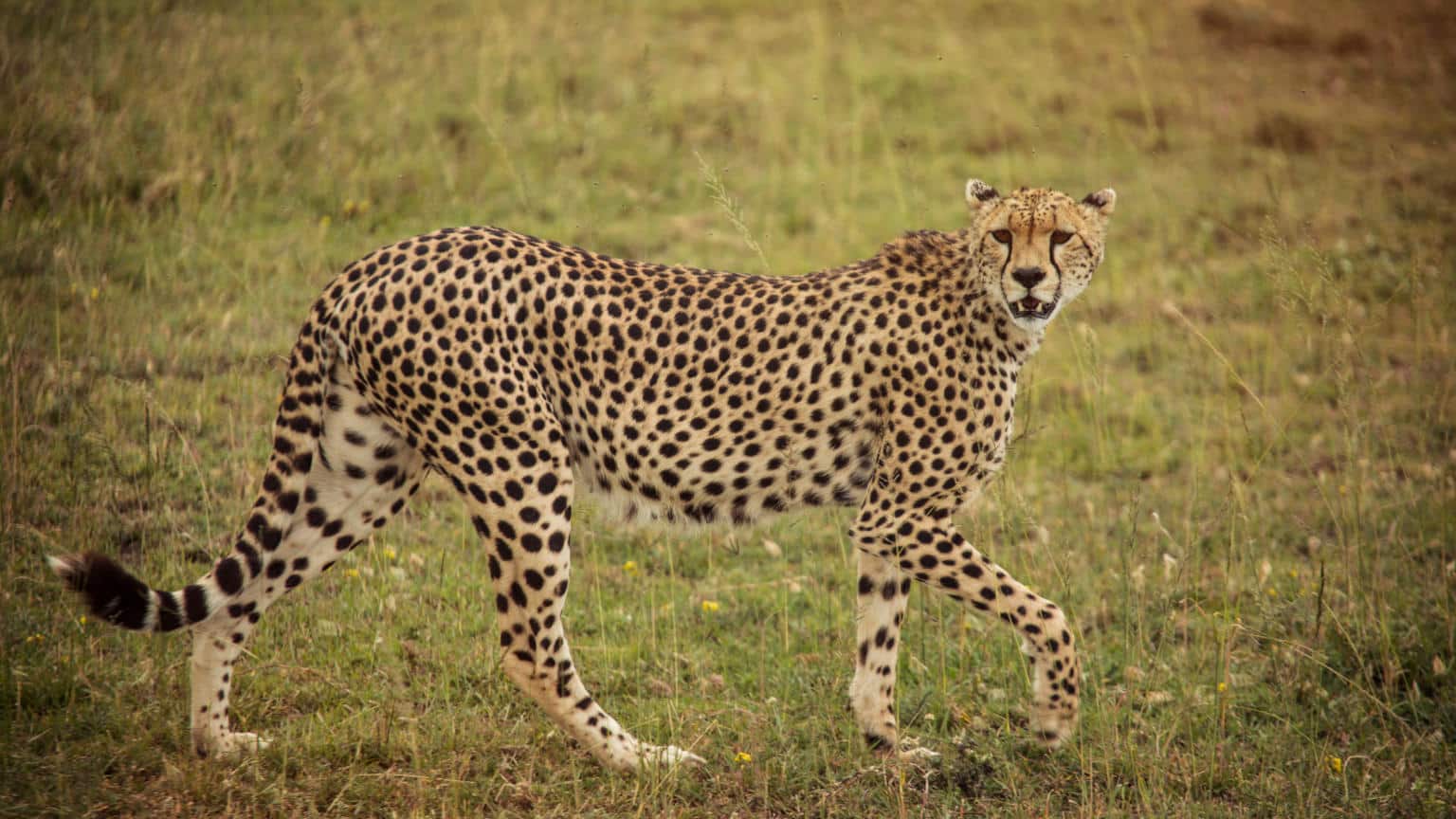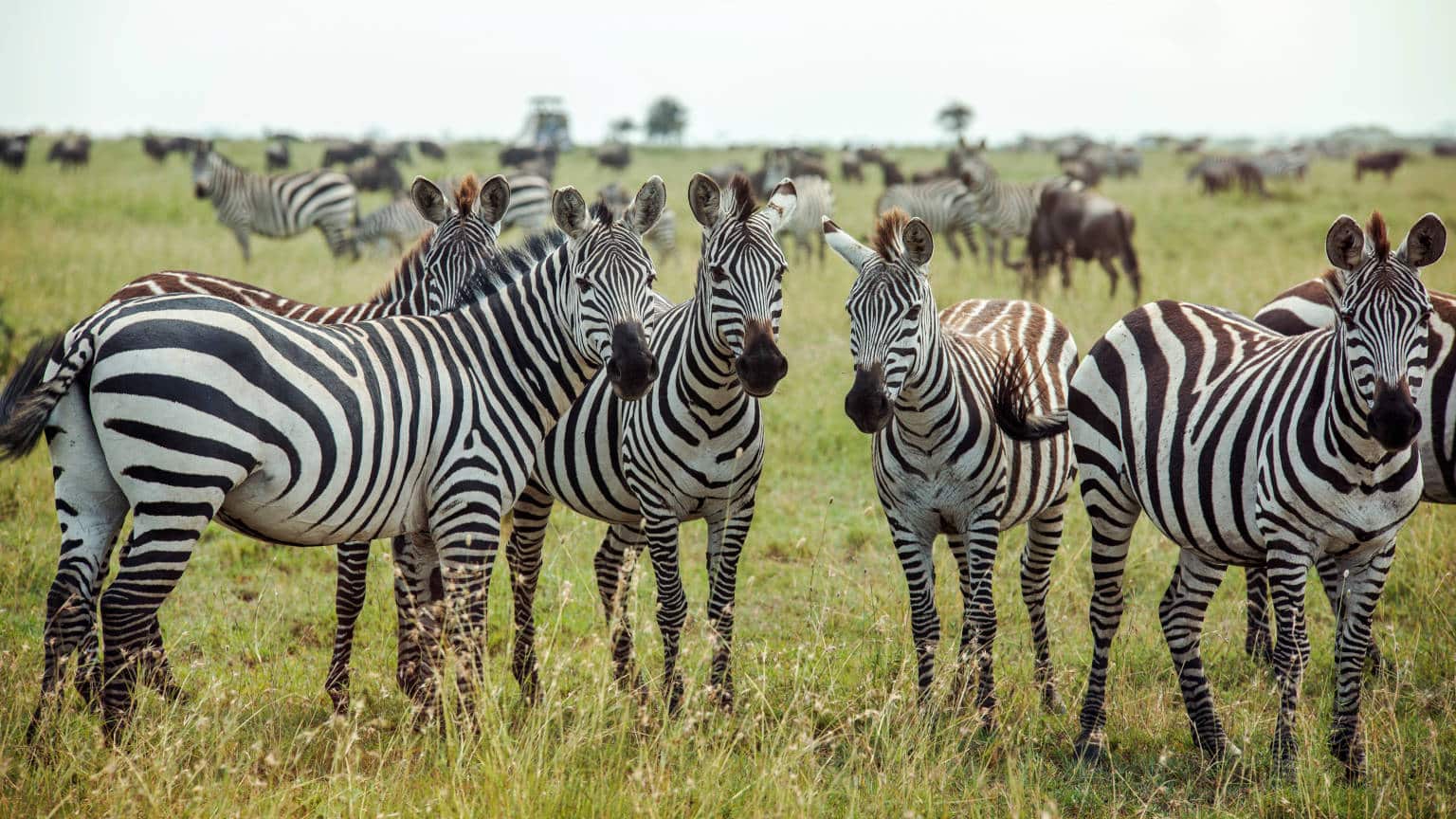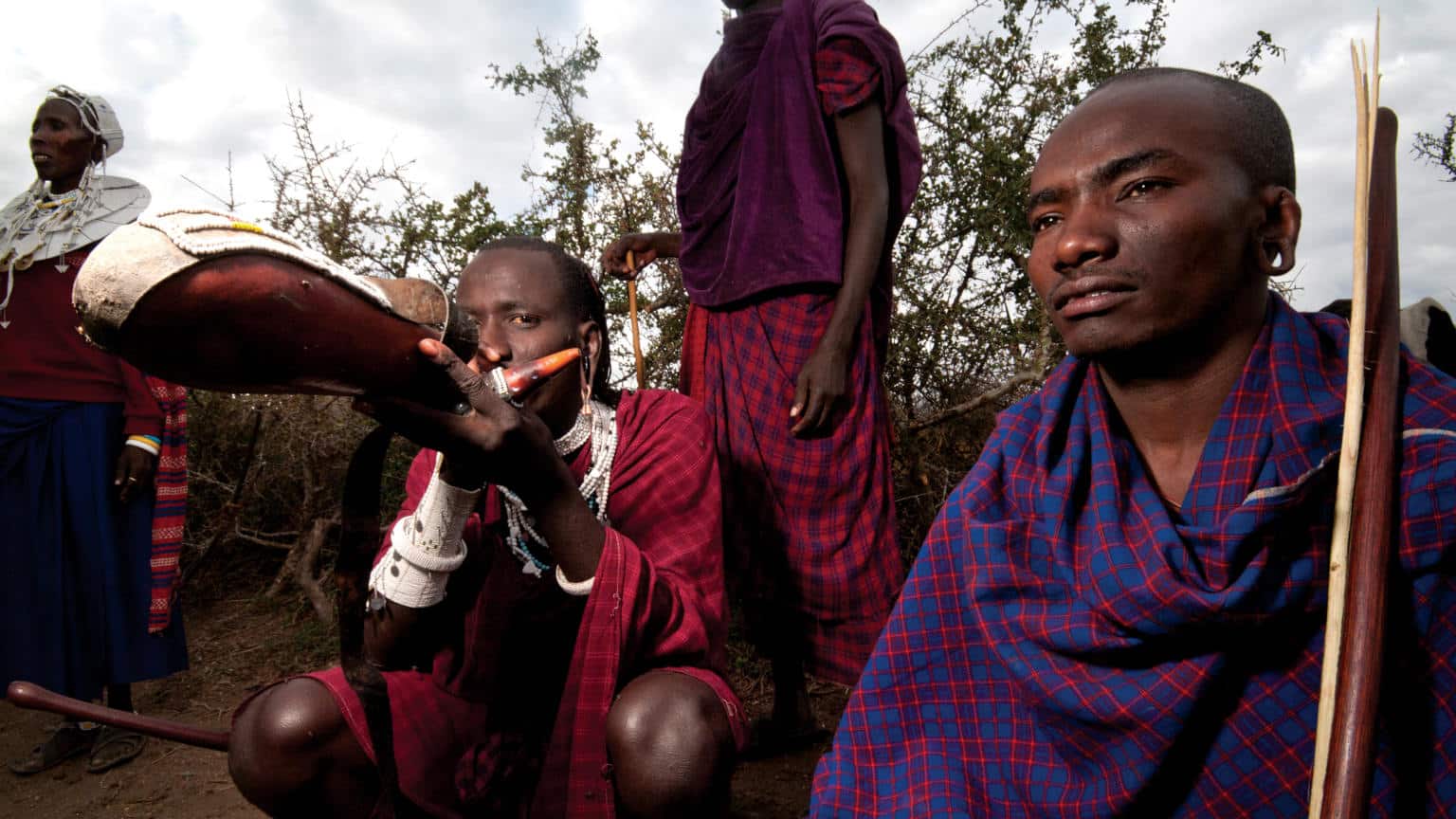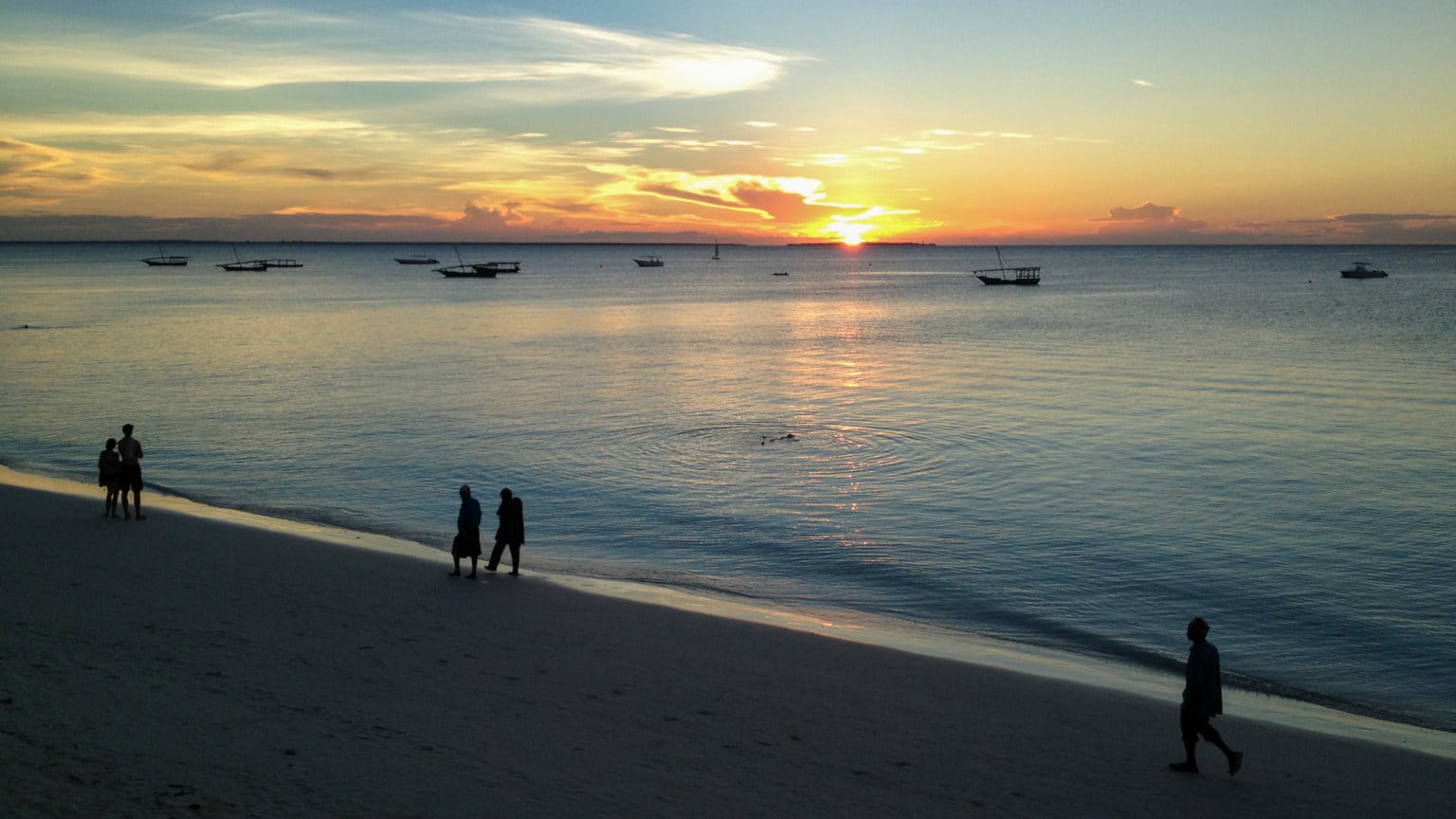Price
 $3704
$3704
Overview
There's no better way to see Tanzania than by sleeping where the wildlife roam, and you'll have the opportunity to do just that on this 12-day tour. Your safari through the Serengeti and Ngorongoro includes an overnight camp at the edge of a crater where lions, buffalo, and zebra like to wander. Then jet over to Zanzibar where historic towns and blissful beaches await. You'll leave with a host of postcard-worthy photos and memorable experiences in your pocket, and perhaps a few grains of sand, too. Visit Tanzania with us, all while earning professional development credit with other educators.
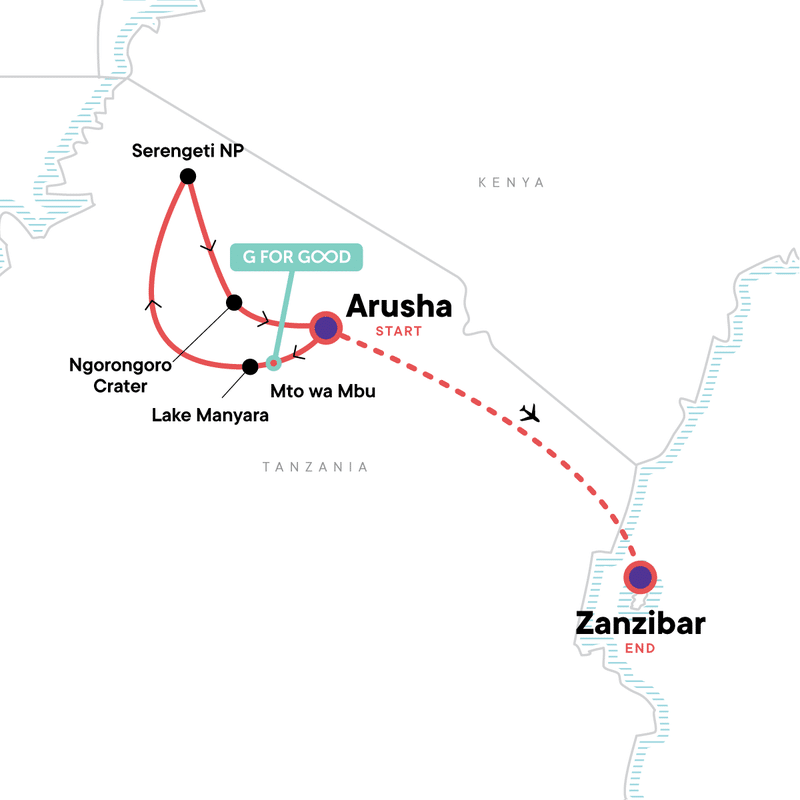
What's Included:
- Lake Manyara wildlife safari drive
- Serengeti wildlife safari drives
- Ngorongoro Crater wildlife safari drive
- Clean Cookstove Project visit
- Mto wa Mbu village visit
- Orientation walk in Stone Town
- Spice plantation guided tour
- G Adventures Tour Leader throughout, certified safari driver/guide, camp crew, local guides
- 11 breakfasts, 5 lunches, 3 dinners – allow $340-$445 USD for meals not included
- Simple hotels (7 nts), full-service camping (4 nts)
- Flight from Arusha to Zanzibar
- All transport between destinations and to/from included activities by 7-seat 4x4 safari vehicle, plane, minibus
What's Not Included:
- International air travel
- Incidentals
- Travel health and cancellation insurance
- Applicable visas
- Tips or gratuities
- Airport taxes
- Beverages
- Meals not mentioned in itinerary
- Optional tours and admissions
- Arrival and departure airport transfers
Itinerary Download PDF
Arrive in Arusha at any time. Due to the potential for flight delays or cancellations, we recommend that you plan to arrive in East Africa at least a day in advance. This will also give you time to adjust to the time difference and overcome any jet lag. We can book extra hotel nights for you in Arusha before and/or after the trip. The closest airport to Arusha is Kilimanjaro International Airport (JRO). If you will be coming to Arusha from Nairobi's Jomo Kenyatta International Airport (NBO) (approximately six hours by land, including the border crossing), we can pre-book a seat for you on a public shuttle bus that leaves Nairobi daily at 8:00 a.m. There are also direct flights from Nairobi to Kilimanjaro International Airport with Precision Air that take about one hour. Hotel Check-in and Welcome Meeting Please note that check-in at the hotel is usually around 2:00-3:00 p.m. There are no planned activities until an intro meeting around 6:00 or 7:00 p.m., usually in the hotel lobby. Check for a sign or ask at the reception desk about the exact time and location of the group meeting. Please make every effort to arrive in time for this meeting. If you are delayed and will arrive late, please inform us. Your tour leader will then leave you a message at the front desk informing you of where and when to meet up tomorrow. After the meeting, you might choose to get dinner at a nearby restaurant with your traveling companions and your tour leader to further get to know one another. Joining Instructions On arrival, please make your way to the hotel. Kilimanjaro International airport is approximately 40km, or 40 minutes, from Arusha. Taxis are available to transfer you to Arusha and cost approximately $50 USD per car. From Nairobi in Kenya, Arusha is approximately 6 hours by land, including the border formalities. To arrive in Arusha from Nairobi, a seat on a public shuttle bus (leaves daily at 8 am) can be pre-booked through GEEO/G Adventures and takes 6 hours. There are also direct flights from Nairobi to Kilimanjaro International with Precision Air that take about one hour. If you prepay for an airport transfer, please look for the driver, who will be holding a sign with the G Adventures logo on it. There are taxi drivers who will want to get your attention and business, so please watch for the official G Adventures representative. For security purposes, your name will not be on the G Adventures sign. Please do not tell the driver your name straight away, but rather ask the driver first to tell you who they are meant to pick up; this will ensure that you go with the right driver. Please be aware that the tour departs Arusha in the morning of day 2. You may wish to arrive in Arusha a day early to avoid complications due to flight delays or cancellations. Accommodation: Outpost Lodge (or similar) * For the actual hotel your specific departure will be using, please check your voucher.
Travel to Mto wa Mbu village and take part in a cultural walk to learn about life in this East African town. Mto wa Mbu has attracted some 18,000 residents from 120 different tribes. During the two-hour tour, visit the village's local market, walk in the farmer's fields, see how huts are constructed, and meet artisans in their shops. Afterward, sit down with our new friends and enjoy a traditional lunch of meat and plantains. Spend the afternoon viewing wildlife along the main road that winds through the lush cool forests of Lake Manyara National Park, overgrown with ficus trees and covered with bromeliads. This western wall of the Rift Valley escarpment is truly stunning. It provides a backdrop for your search for the park's phenomenal birdlife (including raptors), tree-climbing lions, elephants, zebras, hippos, baboons, and buffalos. Look up and see some of the more than 400 species of birds, including pink flamingos, pelicans, cormorants, and storks. Beyond wildlife, Lake Manyara NP is home to giant fig trees, acacia woodlands, mahogany trees, and grassy flood plains. The contrasts of this area are simply breathtaking; the open plains, huge escarpment, central alkaline lake, dense woodlands, and distant volcanic peaks coming together in an area best described by Ernest Hemingway as “the loveliest I have seen in Africa.” Approximate travel time: 2-3 hrs by 7-seat 4x4 safari vehicle Accommodation: Twiga Campsite (or similar) Meals included: Breakfast | Lunch
Drive through the Ngorongoro Conservation Area and on to Serengeti National Park. Marvel at the sheer vastness of this territory, and spot the multitude of animal and birdlife while cruising through this acacia-accented savanna. Your eagle-eyed driver will keep an eye out for wildlife – buffaloes, elephants, lions, wildebeests, zebras, and more. Tanzania’s Serengeti tends to be less crowded than some of Kenya’s reserves, so enjoy the scenery, the vast expanse of the grasslands, the play of light and shadow, and the up-close look at wild Africa. Approximate travel time: 8-9 hrs by 7-seat 4x4 safari vehicle Accommodation: Seronera Campsite (or similar) Meals included: Breakfast | Lunch | Dinner
Rise early for a morning wildlife safari drive, returning in time for lunch. Continue the search for the "big five" in the afternoon while taking in the vastness of the Serengeti plains. You have the option of booking a hot air balloon safari ($579 USD per person). Spirited aloft in a hot-air balloon, view the wildlife and terrain of the Serengeti that only the birds see. Enjoy a champagne breakfast and keep that shutter-finger good and limber—you’ll be using it plenty over the course of your hour in the air. If you have pre-booked a Serengeti Balloon Safari, your flight will be in the morning. You will miss the morning wildlife safari drive with the group, but you will have spectacular views from above. Approximate travel time: Most of the day in a 7-seat 4x4 safari vehicle on safari Accommodation: Seronera Campsite (or similar) Meals included: Breakfast | Lunch | Dinner
Take a morning wildlife safari drive as you depart the Serengeti, then continue wildlife viewing in the Ngorongoro Crater. Head down into the crater and to all the best spots to view wildlife. Spot zebras, gazelles, buffaloes, and warthogs. The swamp and forest are home to hippos, rhinos, elephants, baboons, and monkeys. Keep your eyes peeled and camera ready to capture a pride of lions or a lone leopard walking along the crater floor. The rich pasture and permanent water of the crater floor supports a resident population of more than 20,000 to 25,000 large mammals. Approximate travel time: 4 hrs by 7-seat 4x4 safari vehicle on safari Accommodation: Simba Campsite (or similar) Meals included: Breakfast | Lunch | Dinner
Visit a Maasai village in the Monduli District and witness the benefits of the Clean Cookstove Project. In Tanzania, 95% of people rely on cooking with wood and coal. Women and girls spend hours walking to collect wood every day (making them vulnerable to assault and unable to use their time to go to school). Indoor smoke from open-fire stoves causes cancer, emphysema, pneumonia, blindness, and burns. Take a guided tour of these villages and meet the women that have been trained as stove engineers, visit bomas (traditional homes), and observe (or get your hands dirty) by helping the Stove Team build a stove in a home. See the beneficial impact of the clean-burning stoves on the health and daily lives of the Maasai villagers, especially the women. We arrive in Arusha this evening, back to our start hotel. Approximate travel time: 4-5 hrs by 7-seat 4x4 safari vehicle Accommodation: The Outpost Lodge (or similar) Meals included: Breakfast | Lunch
Enjoy a free day to explore Arusha, or relax at the lodge. Opt to visit the National Natural History Museum, also known as the Old Boma, an old German military outpost that showcases the natural history, wildlife, and culture of Tanzania. The best part of the museum is the wing dedicated to human evolution, featuring fossils found in Tanzania. The privately-owned Cultural Heritage Centre is a unique collection of shops and galleries on the outskirts of Arusha. The spectacular building has a large collection of African art, as well as a restaurant and a shopping center with locally handcrafted items. There is no entrance fee. Maasai Market Curios and Crafts is the perfect place for street shopping, with over one hundred vendors selling souvenirs, arts, and crafts located just beneath the huge clock in the centre of town. Practice your bargaining skills, because prices can be dirt cheap or tourist expensive Accommodation: The Outpost Lodge (or similar) Meals included: Breakfast
Transfer to the airport for a short but scenic flight to this island paradise. The flight from Arusha/Kilimanjaro Airport to Zanzibar is unaccompanied, and you will be met by your local Zanzibar guide on arrival. Your tour leader will give you all the relevant flight information. Arrive in Stone Town in time for lunch and anorientation walk. If you opt to continue on for a longer tour of Stone Town, you will be visiting the Old Slave Market, House of Wonders, Palace Museum; entrance to these sites is optional and are to be purchased on site. Approximate travel time: 1 hrs by private vehicle, 1.5 hrs by plane Accommodation: Spice Palace Hotel (or similar) Meals included: Breakfast
This morning we visit a local spice plantation for a guided tour. Delight your senses and learn about an assortment of spices, such as cloves, black pepper, cardamom, cinnamon, nutmeg, breadfruit, jackfruit, vanilla, and lemongrass, and their various uses. It was the spice plantations that brought the beginnings of Zanzibar’s infamous slave trade dating back to the 1840s. Continue to the white-sand beaches and turquoise waters of Zanzibar's beautiful coast where you will have the afternoon free to swim or relax at the beach. Accommodation: Spice Island Hotel and Resort (or similar) Meals included: Breakfast
Enjoy free time to lounge on the beach, snorkel, or tour the island. See our optional activities list further below for some of the activities available. Accommodation: Spice Island Hotel and Resort (or similar) Meals included: Breakfast
Enjoy free time to lounge on the beach, snorkel, or tour the island. See our optional activities list further below for some of the activities available. Accommodation: Spice Island Hotel and Resort (or similar) Meals included: Breakfast
Morning group transfer from the beach. You can leave the tour in Stone Town (e.g., to extend your stay in Zanzibar), or you can continue with the tour leader to the airport. The local airport is Abeid Amani Karume International Airport (ZNZ), or you can take a ferry (approx. $35-60) from Stone Town to Dar es Salaam and fly out of Julius Nyerere International Airport (DAR). Onward travel from Stone Town/ZNZ should be booked no earlier than 2:30 p.m. Want more adventure? Book two or more GEEO programs in the same school year and receive a discount! GEEO will give you 10% off of the lesser value program(s) (up to 3 programs per year). If you would like to extend your time abroad but don't see another GEEO program that interests you, let us know. We can work with you to find a trip from our tour operator’s much larger catalog. Their tours are open to the general public and not designed specifically for educators, but we can still offer you and your travel companions a discounted educator price on any additional tours that you book. Approximate travel time: 1.5 hrs by private vehicle Meals included: Breakfast
*Itinerary Disclaimer: While it is our intention to adhere to the routes described on our website, there is a certain amount of flexibility built into the itinerary and on occasion it may be necessary, or desirable, to make alterations. The itinerary is brief, as we never know exactly where our journey will take us. Due to our style of travel and the regions we visit, travel can be unpredictable. The information on our website is a general guide to the tour and region, and any mention of specific destinations or wildlife is by no means a guarantee that they will be visited or encountered. Additionally, any travel times listed are approximations only and subject to vary due to local circumstances.
Details
Frequently Asked Questions
Please click here to go to our general FAQ, which has essential information that applies to all of our programs.Resources to Learn & Teach about Tanzania
Visit our recommended reading page to see the list of books GEEO recommends reading before your program (this is not required reading). We also have lesson plans and Pinterest boards that may be useful for you as you learn about your destination and prepare to bring lessons back to your classroom.Terms and Conditions
It is very important for you to visit our Terms and Conditions page before signing up for this program.GEEO Program Confirmation Process
We require a minimum of 6 participants for most GEEO programs. We officially confirm that a program will run once at least 8 people have signed up, which provides a margin for individual cancellations. Nearly all GEEO programs ultimately meet this enrollment quota, and in the rare event that a program does not meet the minimum requirement and GEEO cancels the program, we will work with you to find a suitable alternative or provide a refund of your deposit if you prefer. We encourage you to sign up for any program that interests you, and we will notify the entire group once 6 people are booked and again once 8 people are booked. We always emphasize the importance of exercising caution when making non-refundable travel arrangements, especially given the unpredictable nature of travel. For example, we typically recommend booking flights with flexible change/cancellation policies.Cancellation policy
All cancellations must be submitted to GEEO in written form by emailing your request for cancellation to travel@geeo.org. If you do not receive a confirmation that we have received your written cancellation request, please call us at 1-877-600-0105. Verbal cancellation requests will not be honored.- If you cancel 60 days or more prior to the start of your program, all your program fee payments will be refunded excluding your $350 deposit, which is kept on file for future use and never expires. (Exception for participants who receive grants from our university partners: To address disruption caused by cancellation from grant recipients, deposits paid by grant recipients are forfeited upon cancellation.)
- If you cancel between 30 and 59 days prior to the start of your program, you will receive a 50% refund and your deposit will be kept on file for future use and will never expire.
- If you cancel within 30 days prior to the start of your program, you will receive no refund, but your deposit will be kept on file for future use and will never expire.
Trip Notes & Expectations
Before you decide to travel with GEEO, it is important that you read all of the information about the program contained on this page. Our programs are quite adventurous, and we find that clients who read the trip details in full are happier with their experiences.- FLYING THROUGH LONDON-HEATHROW TO EAST AFRICA?: Please be aware that travelers flying from or connecting through London-Heathrow are currently allowed only one carry-on item and one small personal bag (e.g., purse, laptop bag, briefcase) on flights to Nairobi. If you arrive at the security gate with more, you will be required to check one, which may lead to complications. This policy is current at the time of writing, but local rules may change. We recommend contacting your airline for the most up-to-date information.
- ACCOMMODATION: The group will spend seven nights in simple hotels, typically with en suite bathrooms, and four nights camping. Camping in Tanzania offers an off-the-beaten-track experience, staying at designated public campsites inside and near national parks. These campsites are basic and shared with other groups, especially in high season, which may affect cleanliness.All camping equipment, except sleeping bags and pillows, is provided, including comfortable 4cm-thick camp mattresses and 2-person dome tents that are easy to assemble. The tents have a base area of 4 square meters, are treated for waterproofing, and feature built-in mesh for insect protection. However, under heavy rain, seepage may occur. Campsites in Mto wa Mbu are basic but clean, while those in the Serengeti and Ngorongoro are more rustic, with no electricity. As these camps are unfenced, caution is advised, especially at night—using a flashlight is recommended.This is a full-service camping trip, meaning G Adventures staff pitch tents, prepare meals, and handle washing up. This leaves you free to enjoy your surroundings, making it ideal for first-time campers. While weather is often pleasant, conditions can vary, and you may experience fog, rain, or cooler temperatures. There may also be bugs in certain areas, but these minor inconveniences are outweighed by the chance to immerse yourself in Africa’s natural beauty.You have the option to rent a sleeping bag once you are at your destination, or to pack your own. The cost to rent a sleeping bag in Arusha will be $40 USD. NOTE: In Zanzibar, we stay in twin-share accommodations in Stone Town and at the beach. Beach resort locations are subject to change due to availability. Contact us before booking any post-nights in Zanzibar to confirm the location.
- DAY BAG OR DUFFEL BAG: You will not be taking your main suitcase with you on the four nights of camping. It is important that you have a large day bag or collapsible duffle bag that you take with you on safari.
- TRANSPORTATION: This trip uses a private 7-seat 4x4 land cruisers with sliding windows and pop-up roofs for wildlife viewing. Larger groups will use two vehicles. All vehicles have speed governors set to 80 kph for safety, and wearing seat belts is mandatory. Vehicles are regularly serviced, but due to long travel days and rough roads, breakdowns can occur. Drivers are trained mechanics who will resolve issues quickly to minimize disruptions. Your patience is appreciated if a mechanical issue arises.The journey isn’t physically demanding, but there are long drives on bumpy roads, which can be challenging for those prone to car sickness. However, the diverse African landscape, culture, and wildlife make it worthwhile.A local airline is used to fly between Arusha and Zanzibar, where we travel by minibus.
- ELECTRICITY: The power supply in Tanzania is nominally 240VAC, 50hz. Variable voltage, spikes and sporadic, unexpected, unscheduled power cuts of varying duration can be expected.
- MEALS: When evening meals are not included, your hotel will have a restaurant or you’ll be directed to a good local option. All camp meals are made from fresh local produce, with food shopping done before departure and along the route. Warm breakfasts (e.g., eggs/crepes) are prepared when time permits, otherwise cereals may be served. Lunches, often en-route, are light (e.g., sandwiches, salads), while hot evening meals include a variety of continental and local dishes. Meals are prepared by the crew, with optional assistance from travelers.Please specify dietary requirements before arrival. Bottled drinking water will be at your own expense.
- LUGGAGE COMPLICATIONS: Your luggage must not exceed the dimensions we list in our packing list, so do not over-pack. Luggage on international flights to Nairobi may occasionally be delayed, especially with flights from London-Heathrow or Schiphol (Amsterdam). This is more likely if you have a tight connection, are flying with different airlines, experience a last-minute re-route, or connect through another African city. To prepare, keep important documents, valuables, and a change of clothes in your carry-on.If your luggage doesn’t arrive, you should receive limited compensation from your airline. In Nairobi, lost luggage typically arrives within 48-72 hours, and the airline should forward it to your hotel or elsewhere in Kenya. If you travel to Tanzania before receiving it, local staff can help coordinate retrieval, though airlines may not be proactive. You may need to purchase necessary items locally and hire someone to assist with the airline. Any costs for luggage retrieval or shipping are your responsibility, but G Adventures will assist where possible. Keep all receipts for reimbursement from your airline or insurance provider.
- MANDATORY INBOUND TRAVEL INSURANCE: As of October 1, 2024, the government of Zanzibar requires mandatory Inbound Travel Insurance that all travelers to the island of Zanzibar must obtain from the Zanzibar Insurance Corporation (ZIC) for the duration of their stay on the island. This insurance can only be purchased through the Zanzibar Insurance Corporation and is separate from your standard travel insurance policy. The insurance costs $44 USD per person, and you may be refused entry if you do not have the correct insurance. For more information and to apply for the insurance policy, visit the Zanzibar Insurance Corporation website
- YELLOW FEVER: According to the WHO and CDC, there is no risk of getting yellow fever in Tanzania. It is compulsory to show a valid Yellow Fever vaccination certificate if you are traveling to Tanzania from a Yellow Fever endemic country, or have RECENTLY traveled to a Yellow Fever endemic country (with entry stamps in your passport). According to the Embassy of Tanzania, If you are traveling directly from the United States and transit through another country, a vaccination certificate is NOT REQUIRED unless you will stay for more than 24 hours in a country that is endemic for Yellow Fever (see more here).The of countries identified by the CDC as having risk of transmission of yellow fever here.*We advise all travelers to Tanzania who are coming from a yellow fever risk country to be prepared with a Yellow Fever vaccination certificate. Yellow Fever inoculations need to be administered at least 10 days prior to your entry into the country. Border officials in Tanzania have been strictly enforcing these requirements. Travelers without the correct documentation run the risk of being denied entry, and will not be able to continue with the tour. (Any additional travel expenses will be on your own account.)*
- GROUP LEADER: Please make sure you understand the role of your tour leader on this trip. All GEEO/G Adventures group trips are accompanied by one of G Adventure's group leaders, which they refer to as Chief Experience Officers (CEO). The aim of the group leader is to take the hassle out of your travels and to help you have the best trip possible. They will provide information on the places you are traveling through, offer suggestions for things to do and see, recommend great local eating venues, and introduce you to our local friends. Our itineraries often have plenty of free time to explore on your own. While not being guides in the traditional sense, you can expect them to have a broad general knowledge of the countries visited on the trip, including historical, cultural, religious, and social aspects. We also use local guides where we think more specific knowledge will add to the enjoyment of the places we are visiting – we think it’s the best of both worlds.
Single Travelers
Half of GEEO’s participants travel by themselves, so please don’t worry if you do not have a travel companion for your trip. Our program fee is for one traveler in double-occupancy accommodation, and GEEO can find you a roommate of the same gender if you do not have a travel companion. Most of our programs have a “My Own Room” option, also known as a “Single Supplement,” which is an extra fee that you can pay to have a room to yourself. You will only incur an additional charge if you specifically request a single room. To see the price for the “My Own Room” option, please find your program on our extra services page. If you want to room alone, please email travel@geeo.org to request a single room.Emergency Contacts
Should you need to contact G Adventures during a situation of dire need, it is best to first call their local G Adventures office. If for any reason you do not receive an immediate answer, please leave a detailed message and contact information so they may return your call and assist you as soon as possible. EMERGENCY CONTACT NUMBERS G Adventures Local Office (Nairobi, Kenya) From outside Kenya: +254 727 208 832 From within Kenya: 0727 208 832 G Adventures Local Representative (Tanzania) During office hours, 9 am-5 pm local time: From outside Tanzania: +255 754 400 141 From within Tanzania: 0754 400 141 If you are unable for any reason to contact the local office, please call the numbers listed below, which will connect you directly with the 24-hour Sales team, who will happily assist you. Toll-free, North America only: 1 888 800 4100 Calls from UK: 0344 272 0000 Calls from Germany: 0800 365 1000 Calls from Australia: 1300 796 618 Calls from New Zealand: 0800 333 307 Outside North America, Australia, New Zealand, Germany and the UK: +1 416 260 0999 AIRPORT TRANSFER: If you have purchased an arrival through G Adventures or if an arrival transfer is included in the cost of your tour, please note that your arrival transfer has been arranged based on flight information provided to us. If you are advised of a flight schedule change within 48 hours of your scheduled arrival time, we will do our best to rearrange your arrival transfer however we cannot guarantee this. If your arrival transfer does not arrive within 30 minutes after you have exited the arrivals area please call the local emergency contact numbers listed below for more information. For any issues relating to pre-booked transfers for Nairobi Jomo Kenyatta International Airport, including delays or missed transfers, please contact the airport transfer operator: Musaddiq: +255 754 400 141 or +255 787 400 142 (From outside Tanzania) Musaddiq: 0754 400 141 or 0787 400 142Packing List
Please read this article on GEEO’s blog for our staff’s suggestions on the best gear to pack for your upcoming travels. You must be prepared to carry your own bags and be comfortable carrying them up and down stairs, on and off transportation, and to hotels. As a rule, we try not to have to walk more than 15-20 minutes with your bags, which is why we recommend keeping the weight of your bags between 22-30 lb. Most travelers carry a backpack or rolling bag of small to medium size. No XXL bags please! A daypack is also essential for carrying everyday items. Space is limited on transportation, so there is a limit of one main piece of luggage per person plus a daypack per person. Suggested Checklist- Sleeping bag (it tends to be in the 50s F at night.)
- One outfit of warm clothing for the evening/night and early mornings (Important! It can get really cold at night, especially at the crater.)
- Light windproof/waterproof rain jacket
- Sun hat
- Personal clothing for weather in the 50s to the 80s – we recommend packing 8-9 days of outfits so you only have to do laundry once
- At least one pair of long pants
- Daypack (you will need one large enough to carry your possessions when camping—a collapsable duffel bag can be used instead)
- Sturdy walking shoes (close-toed)
- Sport sandals or flip-flops
- Sunblock
- Sunglasses
- Watch or alarm clock (or use your phone)
- Camp Towel (important!)
- Small flashlight or headlamp (important!)
- Toiletries – your hotels will have soap and shampoo
- Camera (or use your phone)
- First-aid kit, including: lip salve, aspirin, bandaids, anti-histamine, Dramamine (road conditions can be rough), Imodium or similar tablets for mild cases of diarrhea, electrolyte powder, insect repellent, extra prescription drugs you may be taking
- Lightweight silk sleeping bag liner
- Travel pillow
- Money belt
- Water bottle
- Phone/tablet for internet – most hotels have WiFi
- Chargers for electronics as well as converters/adapters, if needed
- AirTags or Tile trackers
- Packing cubes
- Earplugs
- Snacks – packing a few granola bars is a good idea; you can buy snacks when you get there too, so don’t go crazy here
- Ziplock bags for wet clothing
- Reading/writing material
- Hand sanitizer/baby wipes
- Passport (with photocopies)
- Any entry visas or vaccination certificates required
- Travel insurance ID card
- Flight itinerary/boarding pass(es)
- USD/EUR cash
- Credit/debit card
- G Adventures vouchers
- GEEO Classroom action plans for your group – this is sent a few days before departure
Laundry
Hand washing of clothes can be done at campsites, as most have simple facilities for this purpose. We recommend bringing a non-polluting/biodegradable soap, as well as a roll of string to use as a clothes line for drying. If you arrive at the campsite in the late afternoon, or if there is poor weather, it may not be possible for your clothes to completely dry overnight. Your hotel in Arusha also has laundry service for a charge.Passports and Visas
All GEEO programs require that the participant have a valid passport. Please see our general FAQ for information on obtaining a passport. As with all of our trips, we try to provide the most accurate information we can, but governments sometimes change visa rules. It is your responsibility to double check the information we provide below by searching here. Please reference GEEO's Tanzanian tourist visa guidance. As fees and policies can change, we highly recommend that you contact your local embassy or consulate for the most up-to-date visa requirements. It is your responsibility to have the correct travel documentation. IMPORTANT NOTE: It may be required to show a Yellow Fever certificate upon entering Tanzania from certain countries. Please check in with your local consulate and health expert for advice on Yellow Fever and other inoculations required for travel to Tanzania. In addition, please refer to the Trip Notes & Expectations for important details regarding the mandatory inbound travel insurance required for this trip.Money Exchange
The local currency in Tanzania is the Tanzanian Shilling (TSH or TZS). As currency exchange rates fluctuate, we ask that you refer to the following website for daily exchange rates: www.xe.com. Credit cards can be used in major cities and towns, but please do not rely on them as a method of payment, because they are generally not widely accepted. The majority of our optional activities can be paid by credit card, however. Visa/Plus cards are the most widely accepted by businesses in East Africa; it can be more difficult to locate ATMs and businesses that accept Mastercard/Cirrus cards. If you normally use a Mastercard, we highly recommend that you also obtain a Visa card prior to departure. You should also be aware that when purchasing products or services on a credit card, a fee of 3%-10% often applies. Please note that in many areas, there may be occasional power-outages when there will be no electricity for hours at a time. In addition, ATMs outside of larger centers often run out of cash or can be out of order unexpectedly. These factors could affect your ability to access money from ATMs. As such, please do not rely on credit or debit cards as your only source of money. A combination of foreign currency and debit/credit cards for cash advances is best. Always take more rather than less, as you don’t want to spoil the trip by constantly feeling short of funds.Tipping
Tipping is an expected, though not compulsory, component of this program and an expression of satisfaction with the people who assist you on your trip. Although it may not be customary to you, it is of considerable significance to the people who will take care of you during your travels. Tipping is also one of the most direct ways that you can have a positive economic impact within the local community. Although it may not be customary for you, it is an important source of income for those in the tourism industry in Africa. Giving a tip should be seen as a formal “thank you,” and the action should in no way be awkward. The best method of tipping someone who has served your entire group is to plan in advance, and not rush when it comes to saying goodbye. A suggestion would be for each group member to contribute anonymously by putting their tip into an envelope, which the tour can present to the recipient(s), offering their thanks and showing their appreciation. This method brings the action out into the open, allowing for friendly and appreciative interaction between the group and the recipient(s). You may use the following as a guideline per person:- Tour leader: $5 USD (per day)
- Driver: $5 USD (per day)
- Supply Crew: $2-5 USD (per day)
- Local guides: $1 USD (per couple of hours)
- Restaurant Staff: 10% of the cost of bill
Vaccinations
GEEO cannot provide any medical advice, so it is very important to consult your doctor or a travel clinic about which vaccinations you will need for your trip. We recommend contacting Passport Health (http://www.passporthealthusa.com/), which has travel clinics located throughout the United States. You can also check the CDC's recommended vaccinations for your destination. Please take this seriously!Flights
We find the best prices for flights are often available around 90-120 days before departure, but of course this varies greatly from route to route and year to year. You should wait until this trip is confirmed before you book non-refundable flights. GEEO and G Adventures bear no responsibility for any flights purchased before the trip is confirmed. This program begins in Arusha and ends in Stone Town. Please double-check our itinerary for the date by which you must arrive in Arusha. Most people will fly into Kilimanjaro International Airport, but you could also fly into relatively nearby Nairobi (in Kenya) if flights are cheaper. A transfer typically takes 3 hours plus border crossing time. Keep in mind flying into Nairobi could cause complications with visas. You can arrive at any time you choose, but try to make it in time for our 6:00 p.m. Welcome Meeting on Day 1. Your trip ends in Stone Town where you will be transferred to Abeid Amani Karume International Airport. You must not book your departing flight from Abeid Amani Karume International Airport for any time earlier than 2:30 PM.Plugs and Converters
There are two components to provide external power to your device: adapters and transformers (also called electrical converters). The adapter is for your device's plug, adapting the prongs on a standard U.S. two- to three-pronged power cord to fit the local outlets. The transformer/converter changes the local voltage to the voltage used in the U.S. You will want to bring plug adapters for outlet types D and G. The voltage is 230 Volts. (Standard U.S. electrical outlets are 120V.) Most new devices, including phones and laptops, are made to work with the different voltage rates, but some devices, like hair dryers, may only work on the U.S. standard of 120V. Check your device's plug or manual to see what voltage range it requires. Most transformer blocks will have an “Input” line that defines its voltage capacity; for example, “Input: 100-240V” means that it will work with voltages between 100V to 240V. If your device can’t handle the higher voltage, you’ll need to purchase a transformer/converter. You can find world transformers/converters online or at many retail stores in the travel section.Weather
Just south of the equator, Tanzania is huge and its sheer size means that the climate varies considerably within it. However, generally, the long dry season lasts from June through October, and rainfall is uncommon, even on the islands. Temperatures vary widely with altitude and location, but it’s usually a fine, clear sky and sunny weather – it’s a great time to visit Tanzania. Temperatures should be in the 70s and 80s during the day and 50s and 60s at night.🗣️ Advice from Past Participants
"I didn't know that we could use USD most everywhere-tipping, restaurants, stores, markets. Bringing $50-100 in ones and some fives would be very helpful as there is a lot of tipping on this trip. Not only the CEOs (make note there are two of them, one in mainland Tanzania, another in Zanzibar), drivers, and local guides, but often we gave tips to people we talked to in the villages who showed us how they made things. For example, in Jambiani, we tipped the women who showed us how they plant and harvest seaweed and make rope. Plus the service people at hotels were super attentive and we tipped them extra. Also, women that cooked for us in Mto Wa Mbu, Masai in the village, boat drivers in Zanzibar, plus airport transfer tips. A lot of tipping money is needed. "It was colder than I was expecting. Long johns would be a good thing to have for camping." "I think that the wording of the driving time each day could also be better explained. For example, on Day 4 it says that drive time will be most of the day in the vehicle. While that was true, those hours spent during the day were actually on safari and looking at animals. Before I realized this, I wasn't super thrilled about all of those long driving days, but now I understand that it meant that we would be out on safari for the whole day and not just driving from one point to another." "We couldn't bring our entire bags/suitcases with us during the 4 nights of camping. We were instructed to bring a separate smaller bag with us instead." "The guidelines did say that meals would be far apart, but they were really very odd. We would eat breakfast at 7 or 8, not each lunch until sometimes as late as 2 or 3, and then eat dinner at 6 or 7. Make sure you have snacks!" "Bring LOTS of USD cash in SMALL bills. It was really hard to make change, and lots of tips were needed. Also, to stay away from black, blue, and bright colors for the day in Safari with the dangerous flies." "Personally, I would have liked a better understanding of the clothing I needed. There was only one day when I needed to avoid black and blue (due to the tsetse flies), and it was only really chilly one night. I took too many clothes for cooler weather. I knew the dollar was accepted, but they literally would take the dollar ANYWHERE and gave a better deal if I paid with US dollars versus the local currency (Tanzania Schillings). I took $50 in one dollar bills, but I wished I had more. It was hard to get change for a $20. Lots and lots of tips were needed. It was a wonderful trip!" "The trucks that we were in had power, so we could charge external batteries and our phones. There was also pretty reliable phone service through Verizon the entire time. I could easily send out text messages." "All campsites had flushing toilets and showers and were relatively clean."Costs
- Tour Company Fee: See our price in the top right corner
- Optional Activities: $200-900 USD
- International Airfare from the United States: Roughly $1,600-2,200 USD If you require assistance searching for international flights, we would be happy to help you.
- Airport Transfers: Starting at $50 for a taxi (one way)
- Travel Insurance: $79-200 USD Please note: It is mandatory for all of our travelers to have Emergency Medical insurance that covers both emergency evacuation and repatriation to the sum of $200,000 USD. We also strongly recommend purchasing cancellation insurance as an add-on.
- Tanzania Mandatory Inbound Travel Insurance: $44 USD.
- Tipping: Roughly $100 USD.
- Meals Not Listed in the Itinerary: $340-445 USD
- Laundry, Drinks, Phone Calls, etc.: Make sure you budget for these types of expenses
- Souvenirs: Variable. At your personal discretion.
- Vaccines: Variable. Please consult with your primary care provider.
- Non-Educator Donation: $100 USD (suggested donation) This is only for non-educator guests traveling with an educator on a GEEO trip. Educators and retired educators should not make this donation.

